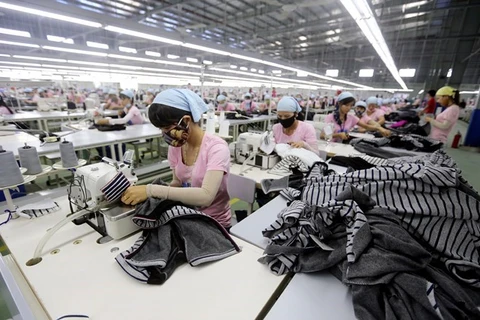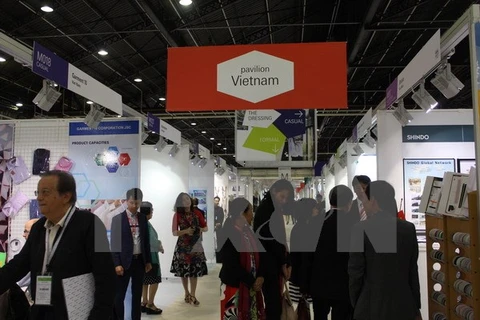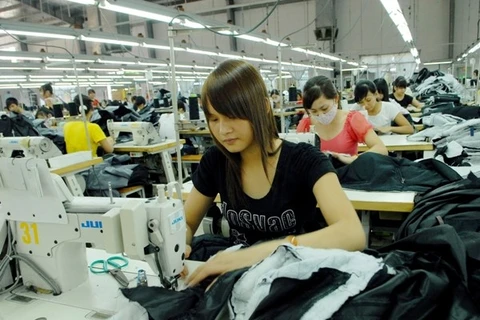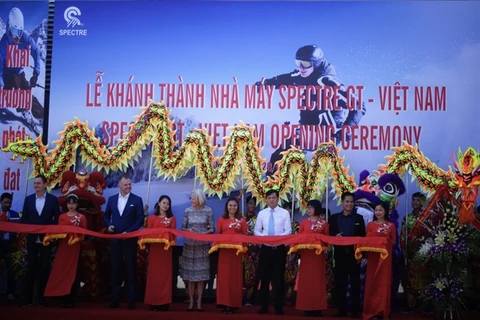Hanoi (VNA) – US garment-textile and footwear businesses are seeking their own investment opportunities in Vietnam as their country has withdrawn from the Trans-Pacific Partnership (TPP) earlier this year.
In late October, the American Apparel & Footwear Association (AAFA) and the American Chamber of Commerce in Vietnam (AmCham Vietnam) held a series of activities in Ho Chi Minh City, including an international workshop on product safety and compliance issues.
In the first eight months of 2017, Vietnam exported over 30.16 billion USD worth of goods to the US, making up 1.99 percent of the US’s total import turnover.
However, during the eight-month period, Vietnam paid over 2.2 billion USD in taxes, ranking second out of the 15 countries paying the highest import taxes to the US.
According to Nate Herman, Senior Vice President of AAFA Supply Chain, Vietnam continued to surpass rivals in export growth to the US in spite of receiving no benefits from any trade preferential programmes or free trade agreements.
The Southeast Asian country’s garment-textile and footwear exports to the US are likely to increase in the coming time, even without TPP, he evaluated.
He noted that the US’s imports of Vietnam’s garment-textile and footwear grew by 8.74 percent and 11.83 percent respectively over the past 12 months and Vietnam was the second biggest exporter to the market, after China.
US retailers and consumers recognised Vietnam’s strengths of quality, prices and delivery commitments, he said, adding that this is the reason why the AAFA and US businesses want to arrive in Vietnam.
Earlier, the National Cotton Council of America (CCI) coordinated with the Vietnam Textile & Apparel Association to organise the Cotton Day 2017 and granted investment licenses to 12 businesses operating in Vietnam and using the US cotton.
The event aims to connect Vietnamese garment-textile enterprises with the US partners, suppliers and experts.
Ryan Cabrera Tuazon, regional director of the US HanesBrands group, said after 10 years of operating in Vietnam, its total investment has stood at around 55 million USD with three factories in the central province of Thua Thien-Hue and the northern province of Hung Yen.
Vietnam is defined as a production destination for HanesBrands in the Southeast Asian region, he said, adding that the factory in Hue is equipped with the latest technologies and manufacturing equipment.
Jon Fee, a senior adviser of Alston & Bird LLP, said without TPP there are other opportunities for the garment-textile and footwear producers in Vietnam such as the Regional Comprehensive Economic Partnership (RCEP), the EU-Vietnam Free Trade Agreement (EVFTA), the “One Belt One Road” initiative, and the “Two corridors and one economic belt” of Vietnam-China strategic cooperation.
Experts said Vietnam’s exports to the US will face difficulties in the coming time due to the US’s tighter regulations on product safety to reduce trade deficit.
Nevertheless, US garment-textile and footwear companies still have opportunities in Vietnam, they said, warning firms to pay due attention to product safety and compliance matters.-VNA
In late October, the American Apparel & Footwear Association (AAFA) and the American Chamber of Commerce in Vietnam (AmCham Vietnam) held a series of activities in Ho Chi Minh City, including an international workshop on product safety and compliance issues.
In the first eight months of 2017, Vietnam exported over 30.16 billion USD worth of goods to the US, making up 1.99 percent of the US’s total import turnover.
However, during the eight-month period, Vietnam paid over 2.2 billion USD in taxes, ranking second out of the 15 countries paying the highest import taxes to the US.
According to Nate Herman, Senior Vice President of AAFA Supply Chain, Vietnam continued to surpass rivals in export growth to the US in spite of receiving no benefits from any trade preferential programmes or free trade agreements.
The Southeast Asian country’s garment-textile and footwear exports to the US are likely to increase in the coming time, even without TPP, he evaluated.
He noted that the US’s imports of Vietnam’s garment-textile and footwear grew by 8.74 percent and 11.83 percent respectively over the past 12 months and Vietnam was the second biggest exporter to the market, after China.
US retailers and consumers recognised Vietnam’s strengths of quality, prices and delivery commitments, he said, adding that this is the reason why the AAFA and US businesses want to arrive in Vietnam.
Earlier, the National Cotton Council of America (CCI) coordinated with the Vietnam Textile & Apparel Association to organise the Cotton Day 2017 and granted investment licenses to 12 businesses operating in Vietnam and using the US cotton.
The event aims to connect Vietnamese garment-textile enterprises with the US partners, suppliers and experts.
Ryan Cabrera Tuazon, regional director of the US HanesBrands group, said after 10 years of operating in Vietnam, its total investment has stood at around 55 million USD with three factories in the central province of Thua Thien-Hue and the northern province of Hung Yen.
Vietnam is defined as a production destination for HanesBrands in the Southeast Asian region, he said, adding that the factory in Hue is equipped with the latest technologies and manufacturing equipment.
Jon Fee, a senior adviser of Alston & Bird LLP, said without TPP there are other opportunities for the garment-textile and footwear producers in Vietnam such as the Regional Comprehensive Economic Partnership (RCEP), the EU-Vietnam Free Trade Agreement (EVFTA), the “One Belt One Road” initiative, and the “Two corridors and one economic belt” of Vietnam-China strategic cooperation.
Experts said Vietnam’s exports to the US will face difficulties in the coming time due to the US’s tighter regulations on product safety to reduce trade deficit.
Nevertheless, US garment-textile and footwear companies still have opportunities in Vietnam, they said, warning firms to pay due attention to product safety and compliance matters.-VNA
VNA
























